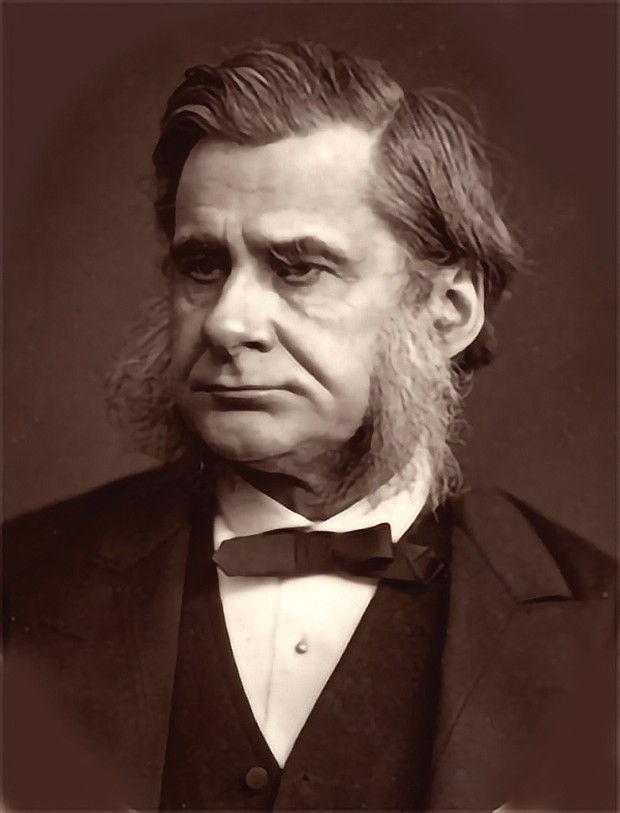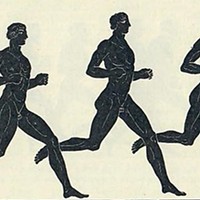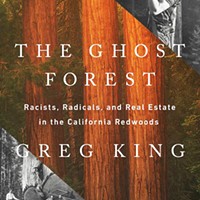
Photo by Lock & Whitfield, via Wikimedia, public domain
Huxley at age 55, 20 years after debating Wilberforce.
[
{
"name": "Top Stories Video Pair",
"insertPoint": "7",
"component": "17087298",
"parentWrapperClass": "fdn-ads-inline-content-block",
"requiredCountToDisplay": "1"
}
]
"I was the most popular man in Oxford for full four & twenty hours."
— T.H. Huxley, following his debate with Bishop Wilberforce
At 25, Thomas Henry Huxley returned from a four-year stint in the Royal Navy — he was assistant surgeon on a Royal Navy corvette exploring the South Seas from 1846 to 1850 — as something of a celebrity. His research papers on marine invertebrates, which he'd been mailing regularly back to London, so impressed the scions of gentlemen scientists of the day that he was promptly elected a fellow of the Royal Society when back on land. For someone so young and of a lowly upbringing, this was a huge honor.
Huxley was soon lecturing at Imperial College in London (my nemesis — I'm a Queen Mary alum), when he became friendly with Charles Darwin, another scientist-voyager, Darwin having spent four years as a naturalist on HMS Beagle. When Darwin's On the Origin of Species was published in 1859, Huxley became its most vocal promoter in the face of huge opposition from the Church of England. The theory of evolution ("survival of the fittest" in the later quick 'n' dirty phrase) directly challenged the Genesis account of our origins. While the church didn't have much to say about how worms and wombats had come about, it was seriously opposed to the notion that humans are essentially cousins of (gasp) chimpanzees, gorillas and orangutans — evolution having done the heavy lifting which, previously, God had taken care of.
"Would you prefer a monkey for your grandfather or grandmother?" asked Bishop Wilberforce, eight months after publication of Origin. The occasion was a debate, on the fourth day of the 1860 meeting of the British Association for the Advancement of Science, between Huxley and Samuel "Soapy Sam" Wilberforce, Bishop of Oxford. The son of William Wilberforce, the abolitionist who had headed the campaign to pass the 1807 (anti) Slave Trade Act, Samuel Wilberforce was a fierce conservative and a formidable debater, "part viper, part soapbox parliamentarian" according to one account.
"The Lord hath delivered him into mine hands," Huxley is supposed to have whispered to a companion on hearing Wilberforce's sarcastic question. Huxley's response has gone down in history as the finest riposte ever: "If the question is put to me, would I rather have a miserable ape for a grandfather or a man highly endowed by nature and possessed of great means and influence and yet who employs these faculties and that influence for the mere purpose of introducing ridicule into a grave scientific discussion — I unhesitatingly affirm my preference for the ape." Touché!
Huxley's adoption of evolution went beyond academic or religious interest. For instance, he lectured on behalf of "Negro emancipation," defying the then common belief in polygeny — that Europeans and Africans are different species — which was used as justification for slavery, especially in the American South. As a comparative anatomist, and long before Watson and Crick cracked the structure of DNA in the 1950s, he marshaled the available evidence of the time to show that we are all descended from common (Black) ancestors.
Were it that simple. Pro-emancipation Thomas Huxley was a man of his time, an imperialist who believed in racial hierarchies: In his mind, to paraphrase Orwell, we're all equal, but some (whites) are more equal than others. As a result, he became an early eugenicist and one-time president of the British Eugenics Society. The controversy lives on. For instance, two years ago, the authorities at Bellingham's Western Washington University removed Huxley's name from its environmental college, citing his "white supremacist values."
Darwin got much right and, in the light of Mendelian genetics and DNA, much wrong. So did his "bulldog," T.H. Huxley. Still, one will always be known as the Father of Evolution and the other? Best comeback ever.
Barry Evans (he/him, [email protected]) is conflicted as to whether we should judge historical figures by the values of their time or of ours.
Speaking of...
-

To Run is Human
Aug 31, 2023 -

The Ghost Forest's Haunting Histories
Jun 15, 2023 - More »
more from the author
-
Doubting Shakespeare, Part 1: Stratfordians vs. anti-Stratfordians
- Apr 25, 2024
-
A Brief History of Dildos
- Apr 11, 2024
-
Eclipse!
- Mar 28, 2024
- More »
Latest in Field Notes
Readers also liked…
-
Trouble on the Line: The Reality Part 2
- Nov 3, 2022
































